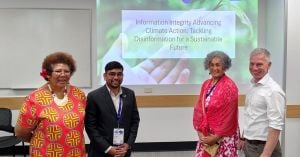On December 11, 2024, the trial of Urfan Sharif and his wife, Beinash Batool, concluded with the couple being found guilty of the murder of their ten-year-old daughter, Sara Sharif. The sentencing marks the end of the case surrounding the tragic circumstances of Sara's death, which have raised serious concerns about child protection and the effectiveness of the care system.
Sara was discovered lifeless on August 10, 2023, under distressing conditions, laying beneath blankets at her family home. The immediate investigation revealed she had suffered horrific abuse, including evidence of repeated beatings and torture over the course of at least two years.
Sara, originally from Woking, England, had been reported to authorities multiple times for issues related to her wellbeing before her tragic death. Her father had made alarming confessions during phone calls and left behind handwritten notes indicating guilt and regret. The case highlighted multiple systemic failures, which allegedly allowed the abuse to persist.
The pivotal moments leading up to the courtroom verdict began with Sara's detention from school. Her educational environment had raised red flags due to visible bruises and signs of distress. Teacher concerns prompted investigations by local social services, but these inquiries failed to lead to proactive intervention. Instead, they resulted merely in heightened monitoring, after which Sara was withdrawn from school.
Despite previous allegations against Urfan, including accusations of domestic abuse from former partners, the family court system granted him custody of Sara. The courts placed significant weight on Sara’s expressed wishes during these proceedings, disregarding the multitude of red flags related to her father’s conduct.
Reports indicated prior warnings about Sara’s condition were not effectively communicated between education and social protection agencies. This gap reflects broader issues concerning data sharing among entities responsible for child welfare. Calls for legislative reform and enhanced monitoring of homeschooling practices, especially when abuse concerns are highlighted, have intensified as this case gained national attention.
Sara’s death has not only illuminated her tragic story but has called forth voices urging for immediate and decisive reforms. Prominent figures, including Dame Rachel de Souza, England's Children's Commissioner, urged for laws to bar homeschooling under suspicion of child abuse. She characterized the existing arrangements as woefully inadequate, asserting, "If a child is the suspected victim of abuse, they cannot be educated at home. Being in school is a safeguard. They are safer under the eyes of teachers."
Sharif and Batool faced grave charges in court as the evidence presented during the nearly ten-week trial revealed Sara’s unimaginable suffering. Autopsy results highlighted at least 71 external injuries, some caused by blunt force, burns, and bite marks. A combination of physical trauma described as torture over years culminated tragically when Sara’s life was taken on August 8, 2023.
Details of Sara's last days revealed horrifying truths. Before her untimely death, she had been forced to wear the hijab under dubious circumstances, ostensibly to hide her injuries. Neighbors reported hearing screams and concerns from school staff were repeatedly raised about her condition—yet action wasn’t taken.
With the jury delivering the guilty verdict, the court signaled the need for reflection on the efficacy of the child protection systems. Many have voiced concerns over the systemic failures highlighted during the trial and the impact on the lives of vulnerable children.
At the heart of the proceedings were the chilling details of domestic violence embedded within the narrative surrounding Sara's life. Urfan’s previous arrests for abuse, including charges from past partners, painted a grim picture of his character—a character described as manipulative and controlling. The trial dissected years of neglect, emotional and physical penalties, leaving many questioning how systems purportedly built to protect children allowed such horrific abuse to occur.
Outside the courtroom, Sara’s story has lit fires of outrage against systemic failures, reigniting debates over child welfare and policies for education and safeguarding. Advocacy groups urged necessary changes to prevent any child from facing similar fates.
Social services and educational authorities are now under scrutiny, with calls for clarity and accountability echoing within public discourse. The investigation initiated by Surrey County Council seeks to understand what went awry at institutional levels, dissecting the events preceding Sara’s tragic conclusion.
Difficult conversations surrounding abuse often stall due to stigma and fear. The exposure of Sara's case is seen as pivotal, pushing more open discussions on family dynamics and intervention strategies. Observers noted the emotional weight felt by jurors throughout the trial, emphasizing the human cost of ignoring the signs.
Sara’s mother, Olga Domin, who had come from Poland, expressed her heartbreak upon learning of her daughter’s fate. After the trial concluded, her tribute to Sara overflowed with grief, underscoring the personal loss felt by communities extended far beyond the courtroom. "Sara had beautiful brown eyes and an angelic voice. Everyone who knew Sara will know her unique character and beautiful smile," she said, expressing the deep sorrow felt by many.
Looking toward the future, there is hope for systemic improvement, stemming from the lessons learned through Sara's tragic experience. Authorities have committed to enhancing practices within child welfare systems to identify and support those at risk, with the intention of ensuring no child suffers as Sara did.
Though the verdict was delivered, the fight for justice extends beyond the courtroom, demanding mobilization from societies determined to prioritize the protection of children. Advocates recognize this moment as one not just for reflection but for action, ensuring changes are made to prevent injustice from repeating itself. Sara’s memory, along with the call for accountability, aims to bring reformative actions to child safeguarding practices.
Eventual sentencing for Urfan Sharif, Beinash Batool, and Faisal Malik is scheduled. The community awaits meaningful remediation of the societal failings exposed through this harrowing case, hoping it spurs necessary changes to protect children universally.



